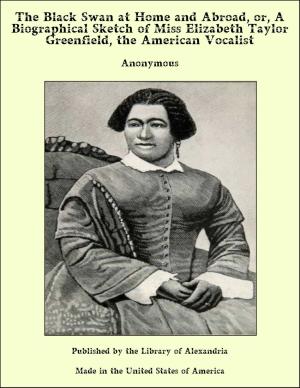Outlines of the Women's Franchise Movement in New Zealand
Nonfiction, Religion & Spirituality, New Age, History, Fiction & Literature| Author: | William Sidney Smith | ISBN: | 9781465615831 |
| Publisher: | Library of Alexandria | Publication: | March 8, 2015 |
| Imprint: | Language: | English |
| Author: | William Sidney Smith |
| ISBN: | 9781465615831 |
| Publisher: | Library of Alexandria |
| Publication: | March 8, 2015 |
| Imprint: | |
| Language: | English |
ALTHOUGH the seeds of the Women's Franchise movement had been sown for a quarter of a century and had taken root in many thoughtful minds in the colony, the subject was still regarded as an academic one rather than a matter tor practical legislation. Among those convinced of the wrongfulness of debarring women from a share in the making of laws under which they lived and, in many cases, suffered, was Dr James Wallis. A man of education and rhetorical power, a wide reader and an acute thinker, he was in many respects well fitted to be the forerunner of the humanitarian legislation of later days. For a number of years Dr. Wallis had advocated manhood suffrage and the admission of women to the franchise. In 1877 he made his appearance in Parliament as the representative of the constituency of Auckland City West. On August 8th of the following year he moved, "That in the opinion of this House the electoral disabilities of women should be entirely removed, and that the same political rights and privileges should be granted to women as to men." The time seemed opportune tor such a proposition. Sir George Grey, one of the most remarkable empire-builders ever sent forth by Great Britain, had, after many years of Imperial service, entered the political arena as a private citizen, and was now Premier of the Island Colony in which he had for two periods exercised viceregal authority. His battle cry had been, "The rights of the people and of the unborn millions," and his eloquent tongue and courtly manner gave him an almost magic charm. There was every reason to expect that an affirmation of the rights of one-half of the people would have his fullest sympathy and warmest support. But Sir George Grey was rather for the people than with the people. Half a century of command had ill fitted him to "play second fiddle," and he looked with coldness and indifference on the motion moved by Dr Wallis. The latter made a long and eloquent speech in support of his proposition, dwelling on the fact that our rights belong to us, not because we are male or female, but because we are human beings. The motion was seconded by Mr Fox (afterwards Sir William Fox). Mr Stout, now Sir Robert Stout and Chief Justice of the colony, drew attention to the fact that the Government was introducing an Electoral Bill, and suggested that the discussion as to the propriety of enfranchising women might be fittingly deferred until such time as this Bill was before Parliament. Dr Wallis accepted the suggestion, but by an adroit use of the forms of the House the motion was prevented from coming on again.
ALTHOUGH the seeds of the Women's Franchise movement had been sown for a quarter of a century and had taken root in many thoughtful minds in the colony, the subject was still regarded as an academic one rather than a matter tor practical legislation. Among those convinced of the wrongfulness of debarring women from a share in the making of laws under which they lived and, in many cases, suffered, was Dr James Wallis. A man of education and rhetorical power, a wide reader and an acute thinker, he was in many respects well fitted to be the forerunner of the humanitarian legislation of later days. For a number of years Dr. Wallis had advocated manhood suffrage and the admission of women to the franchise. In 1877 he made his appearance in Parliament as the representative of the constituency of Auckland City West. On August 8th of the following year he moved, "That in the opinion of this House the electoral disabilities of women should be entirely removed, and that the same political rights and privileges should be granted to women as to men." The time seemed opportune tor such a proposition. Sir George Grey, one of the most remarkable empire-builders ever sent forth by Great Britain, had, after many years of Imperial service, entered the political arena as a private citizen, and was now Premier of the Island Colony in which he had for two periods exercised viceregal authority. His battle cry had been, "The rights of the people and of the unborn millions," and his eloquent tongue and courtly manner gave him an almost magic charm. There was every reason to expect that an affirmation of the rights of one-half of the people would have his fullest sympathy and warmest support. But Sir George Grey was rather for the people than with the people. Half a century of command had ill fitted him to "play second fiddle," and he looked with coldness and indifference on the motion moved by Dr Wallis. The latter made a long and eloquent speech in support of his proposition, dwelling on the fact that our rights belong to us, not because we are male or female, but because we are human beings. The motion was seconded by Mr Fox (afterwards Sir William Fox). Mr Stout, now Sir Robert Stout and Chief Justice of the colony, drew attention to the fact that the Government was introducing an Electoral Bill, and suggested that the discussion as to the propriety of enfranchising women might be fittingly deferred until such time as this Bill was before Parliament. Dr Wallis accepted the suggestion, but by an adroit use of the forms of the House the motion was prevented from coming on again.















